
Exploration assignments of transformations with both Algebra 2 parent functions and Trigonometric Functions.
- Subject:
- Algebra
- Mathematics
- Trigonometry
- Material Type:
- Assessment
- Homework/Assignment
- Author:
- Rachel Hyder
- Date Added:
- 03/10/2020

Exploration assignments of transformations with both Algebra 2 parent functions and Trigonometric Functions.
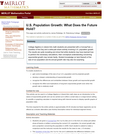
College Algebra or Liberal Arts math students are presented with a ConcepTest, a Question of the Day and a write-pair-share activity involving U.S. population growth. The results are quite revealing and show that while students may have learned how to perform the necessary calculations, their conceptual understanding concerning exponential growth may remain faulty. Student knowledge (or lack thereof) of the size of our population and its annual growth rate may also be surprising.
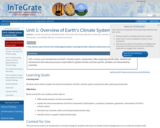
Unit 1 serves as an introduction to Earth's climate system components. After exploring climate data, students are introduced to the natural processes responsible for global climate and how specific variables are interpreted by scientists.
(Note: this resource was added to OER Commons as part of a batch upload of over 2,200 records. If you notice an issue with the quality of the metadata, please let us know by using the 'report' button and we will flag it for consideration.)
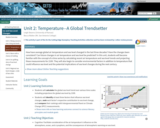
How have average global air temperature and sea level changed in the last three decades? Have the changes been consistent? Can future changes in air temperature and sea level be predicted? In this unit, students will become familiar with the concept of a time series by calculating recent air temperature and sea level trends and projecting these measurements for 2100. They will also begin to consider environmental factors in addition to temperature that could influence sea level and the potential implications of sea level changes during the next century.
Show more about Online Teaching suggestions
Hide
Online-adaptable: The lecture and main data analysis exercise can easily be moved online. Student discussions are designed to be intermixed into the flow of the lecture and exercise. Thus moving to online discussions would be might take a bit more planning.
(Note: this resource was added to OER Commons as part of a batch upload of over 2,200 records. If you notice an issue with the quality of the metadata, please let us know by using the 'report' button and we will flag it for consideration.)
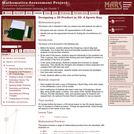
This lesson unit is intended to help you assess how well students are able to: recognize and use common 2D representations of 3D objects and identify and use the appropriate formula for finding the circumference of a circle.
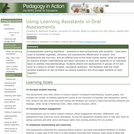
Undergraduate Learning Assistants -- prepared to work productively with students -- have been used to facilitate ungraded, voluntary oral assessments offered prior to exams. Oral assessments last one hour, and are offered prior to the three course exams. Orals are geared to improve student understanding and allow instructors to work with students on an individual basis to address misunderstandings. Students attend oral assessments in groups of 5-6 and work at a board to answer scripted, conceptual questions. The facilitator asks the initial scripted questions as well as follow-up probing questions and encourages students to work together.